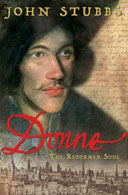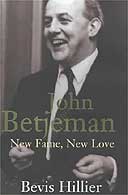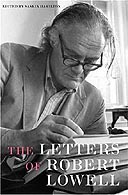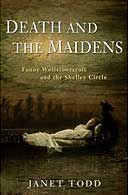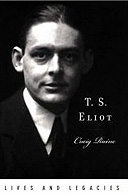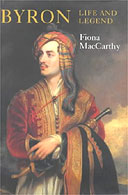Donne: The Reformed Soul
by John Stubbs (Viking £25, pp565)
At the start of a fiendishly inventive poem that consists exclusively of ways to torture and humiliate anyone rash enough to invade the author's privacy, John Donne wrote: 'Whoever guesses, thinkes or dreames he knows/ Who is my mistris, wither by this curse.' No potential subject has ever rubbished his or her future biographer more comprehensively than Donne in 'The Curse'.
Not that John Stubbs need worry. This book is far too smart to subject Donne's poems to documentary guesswork or dream of identifying their recipients. 'The girl about whom "The Perfume" was written may never have read it,' Stubbs says airily, 'may never have even existed.' As for Donne's wife, who certainly existed and for whose sake he risked everything, virtually the only indisputable fact about her remains her name, Ann More. There is no way of knowing what she thought or looked like, let alone how she felt about the poems her husband may or may not have written for her. His Songs and Sonets include some of the most passionate and peculiarly personal love poetry ever written but, for all Stubbs or anyone else can tell, Donne might have been one of those poets who make love more fiercely on paper than in bed.
Biography, on the face of it, is not necessarily the best investigative tool for such an elusive and abusive subject. Any attempt to write Donne's life risks ending a detailed account of the historical context with a poet-shaped hole at its core. A further problem is that he was, in any case, only incidentally a poet. Donne wasn't proud of his efforts in that line and strenuously opposed their publication. The last thing he wanted was for contemporaries to write him off as part of that low-grade literary rabble, 'poets with theyre idle pamflets'.
The son of a successful City ironmonger who died when he was four, he trained at Oxford, Cambridge and the Inns of Court before enlisting at 24 on an expedition setting out to make trouble for the king of Spain. The poet was one of '300 green-headed youths covered with feathers, gold and silver lace' who sailed for Cadiz in 1596 under the Earl of Essex, himself dressed to kill in outfits of white satin and bejewelled orange velvet. Donne had himself painted at this point, in his sumptuous black volunteer's uniform with big, floppy, black hat and filmy, white silk collar calculated to set off the wisps of designer stubble accentuating his strong jaw and sultry, Jaggeresque red lips. The portrait puts him firmly among a buccaneering elite of gentlemen 'wit pyrats'. Publicity-seeking was beneath him. Working for money was, as he said with characteristic vehemence, 'worse than imbrotheld strumpets prostitute'.
First-hand experience of the sack of Cadiz, or the decidedly less successful assault on the Azores two years later, can only be inferred between the lines of his poetry and prose. His generation's love of make-believe - play-acting, dressing up and showing off - was a crucial defensive tactic against the grim realities of a world where flogging, flaying, hanging, burning, beheading and disembowelling were commonplace on the streets of London. Donne grew up in a reign of terror aimed specifically at Catholic families like his own. He was a great-great-grandson of Sir Thomas More, England's most illustrious Catholic martyr. His only brother, Henry Donne, died young in prison attempting to protect a Catholic priest, and two of his uncles fled the country carrying bits of More's teeth in their pockets. Donne's mother, herself an undercover resistance agent in his youth, was said to have brought the saint's head with her and kept it under the bed when, as an old lady, she finally moved in with her son.
Horrific violence lay behind his decision to settle for Protestantism and the future rather than cling stubbornly to Papism and the past. Extremism in other directions brought its own havoc to his private life. All that can be said for sure about his relationship with his wife is that it ruined his life and hers. She was 15 years old when they married in secret; he was 29. He was promptly sacked from his prestigious post as secretary to the head of the judiciary, Sir Thomas Egerton, and thrown into prison pending prosecution by his outraged father-in-law.
By the time Donne finally won his case, he had effectively ditched all chance of a career. The couple retreated to live on charity and handouts in 'the barbarousnesse and insipid dulnesse of the Country'. Poverty and isolation were compounded by 14 years' failed job-seeking on his part and almost annual child-bearing on hers.
Five of her 12 babies died. Donne said he could neither afford medicine when his children fell ill, nor the funerals that followed. 'I have paid death one of my Children for my Ransome,' he wrote bleakly, describing his recovery from fever to a friend, and adding an apologetic postscript: 'Because I loved it well, I make account that I dignifie the memorie of it, by mentioning of it to you.' The 'it' in this sombre letter was, as Stubbs points out, three-year-old Mary Donne. Her newborn brother, Nicholas, had just died, and six months later her parents would lose another son, seven-year-old Francis.
Ann Donne was 28. 'The sicknesse of her children stupefies her,' said her husband. His grief and guilt can be gauged only by his savage public excoriation of sex and marriage in the aftermath of her death in childbirth three years later. Donne responded to her loss with a misogynous rancour a world away from the radiant, sensuous serenity and confidence of 'The Extasie', 'The Anniversarie' or 'The Sunne Rising'.
Two years before his wife died, Donne had finally capitulated to friends who urged him to become a priest. An extraordinary release of pent-up intellectual and imaginative energy secured him, within six years, the key post of dean of St Paul's. This was the old medieval cathedral, not yet destroyed by fire - a vast, sprawling, rearing hulk, 'a myle long, or verie neere', which housed shopping malls, storage depots and job centres as well as serving as the capital's media hub. Audiences at Donne's sermons included everyone from government policy-makers, top lawyers and City traders to the pickpockets working the crowd and the drunks pissing on the pillars at the back.
A public chiefly interested, then as now, in 'popular and seditious Calumnies and Scandals, and Reproaches cast upon the present State and Government' found itself mesmerised by Donne. His lucidity, authority and passion touched the hearts of his contemporaries. Stubbs's account of the dean's sermon on light on Christmas Day, 1621 is one of the high points of this rich, generous and capacious book. Its triumph is to show how the brilliant, abrasive, phenomenally direct voice of the Songs and Sonets - the young Donne counted by posterity among this country's greatest poets - deepens and darkens, cracking sometimes under the harsh strain of his middle years, only to re-emerge in the humane and powerful sermons of his last decade opposing tolerance and moderation to the sectarian schismatics and warring fundamentalist factions of his day.
· To order Donne: The Reformed Soul for £17 with free UK, go to observer.co.uk/bookshop or call 0870 836 0885
Donne rhyming
Holy Sonnet I
by John Donne, c. 1609
Thou hast made me, and shall Thy work decay?
Repair me now, for now mine end doth haste;
I run to death, and Death meets me as fast,
And all my pleasures are like yesterday.
I dare not move my dim eyes any way;
Despair behind, and Death before doth cast
Such terror, and my feeble flesh doth waste
By sin in it, which it towards hell doth weigh.
Only Thou art above, and when towards Thee
By Thy leave I can look, I rise again;
But our old subtle foe so tempteth me,
That not one hour myself I can sustain.
Thy grace may wing me to prevent his art
And thou like adamant draw mine iron heart.
